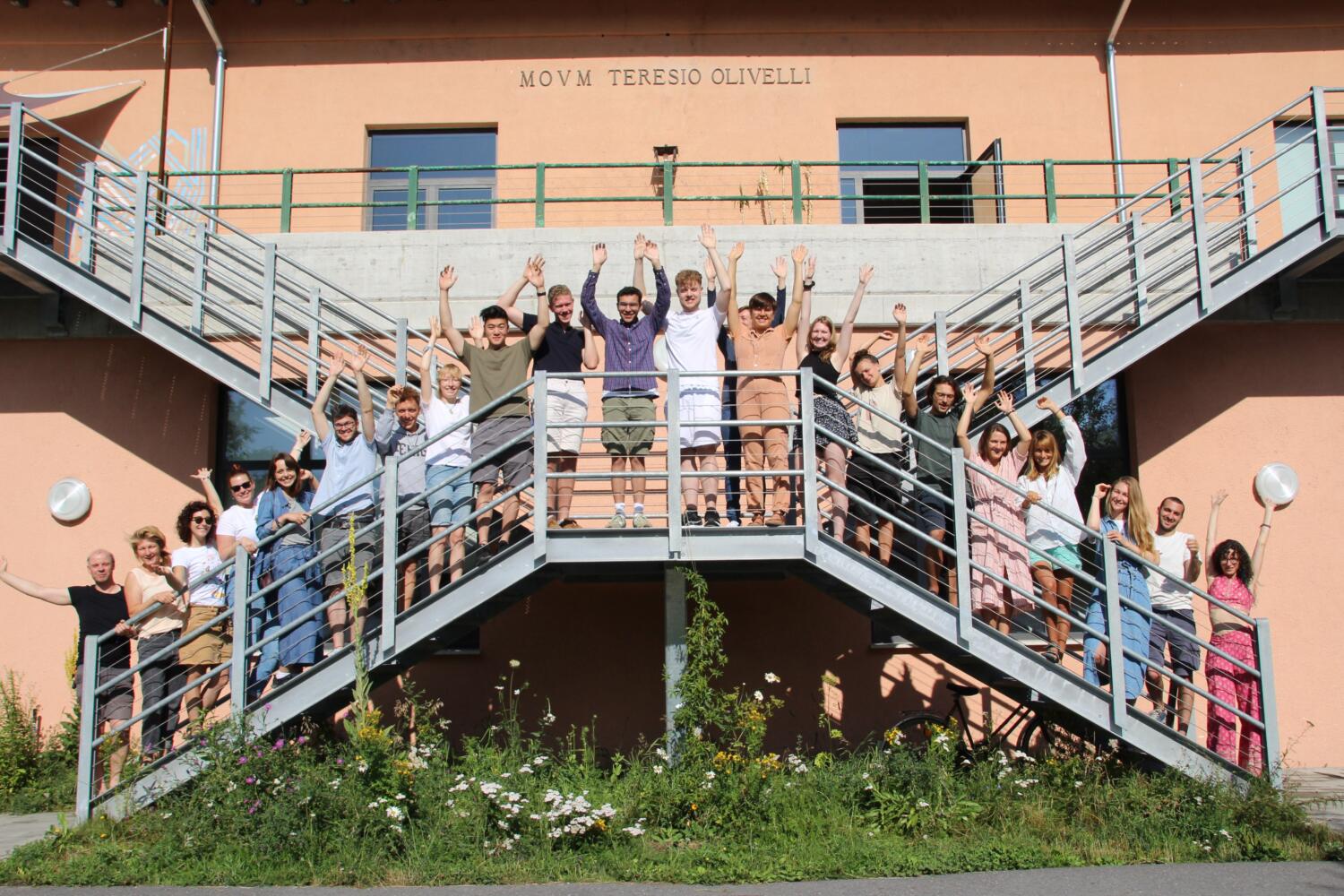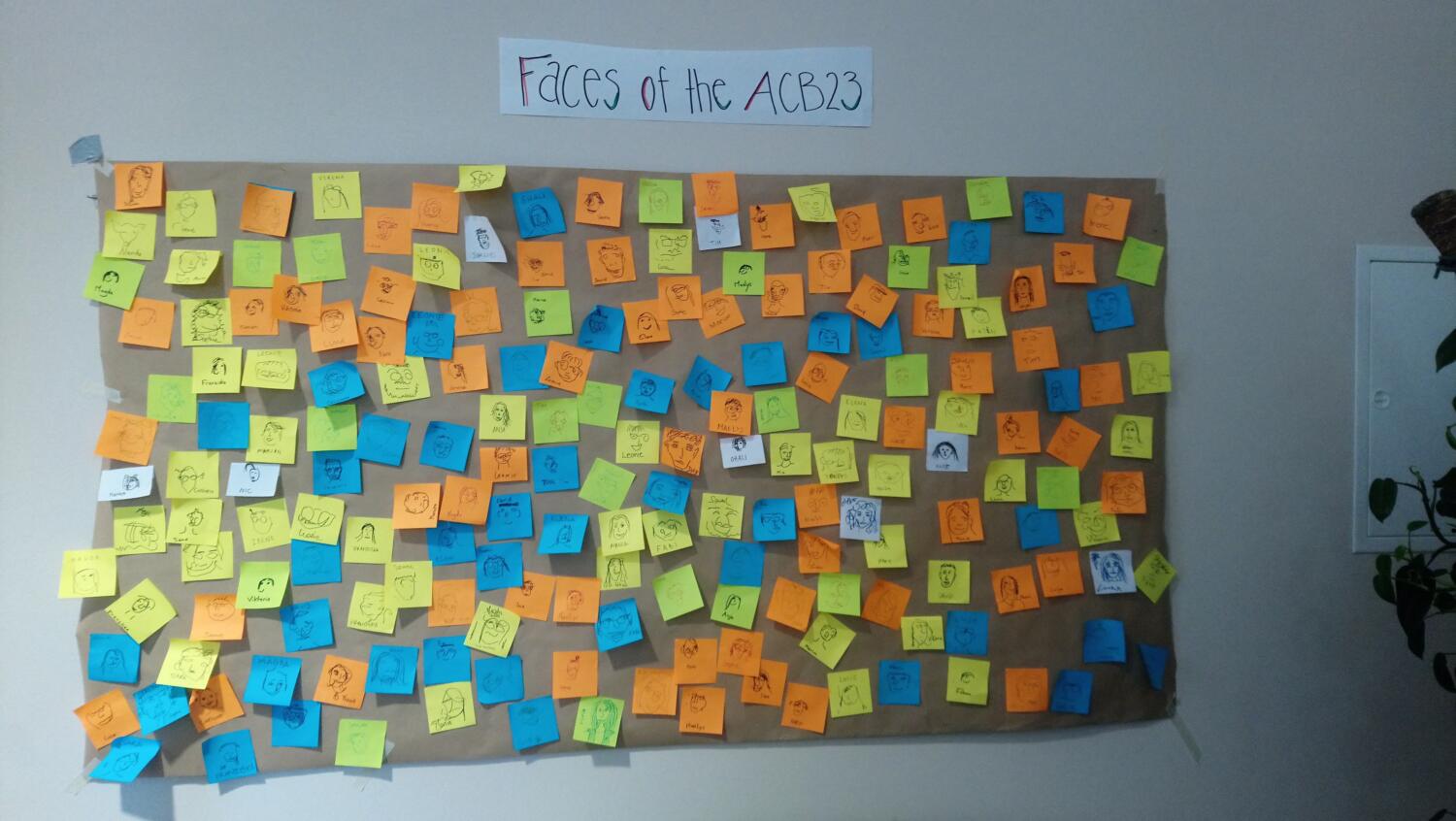
Bustling social life, but also innovation, was once again the order of the day for us in Silandro during the first week of July. With our hosting role for the Alpine Changemaker Basecamp 2023, we were able to combine two of our (many) passions: Cutting-edge sustainability projects and smiling, happy people in every room of BASIS. With a name like „Alpine Changemaker Basecamp“, many readers may now think of mountain climbing. But this 5-day event has little to do with the achievements of Messner, Kammerlander and the like (even if one project coincidentally involves climbing!). But it has a lot to do with giving young ambitious people from all over the Alpine region the tools and skills to support said Alpine region.
But let’s look at everything in turn:
Changemakers of the (alpine) world, unite
After the success of the 1st Alpine Changemaker Basecamp in summer 2021 held in Valposchiavo, Switzerland, it was only a matter of time before a second edition would follow. In 2023, the Alpine Changemaker Network, CIPRA and other partners (more on that below) once again invited innovative and visionary young minds from the entire Alpine region, i.e. Italy, Germany, Austria, Switzerland, France, Slovenia, Liechtenstein and relevant neighbouring areas, to come together for a five-day event. The only entry requirements for the call: 18 to 30 years old, hailing from the aforementioned locations and, above all, equipped with an innovative idea and a project concept for good, sustainable living in the Alpine region. As expected, there were a lot of interested applicants, 18 of whom finally came to us at the BASIS in Silandro from 3 July to 7 July 2013.
Now, what exactly is such a Basecamp? In short, it contains everything that the participants could use to work on their respective projects, garnished with a varied supporting programme. The changemakers were accompanied by a number of experienced mentors from various fields – some of them previous ACB participants – who were happy to share their experience, techniques, tips and tricks. Among them, by the way, our colleagues Magda Tumler and Ghali Egger and our external collaborator Luca Daprá!
However, this process did not take place in the form of dry classroom lectures, quite the opposite. Inputs with the whole troop or in smaller working groups, individual coaching with the mentors as needed, eye-to-eye exchanges among the participants and self-organised work and presentation of results were used to advance the content of the projects on the one hand, but also to teach the changemakers generally valuable techniques and skills that can be useful to them in the future in all their endeavours and help them to develop and implement their ideas.
Since one has to relax and switch off in between so much intensive learning, there was still more than enough time for getting to know each other informally, for exciting discussions (some even unrelated to the subject matters) and for great shared experiences, quite a few of them of a culinary nature. With our staff members Ghali Egger and Magda Tumler as hosts and the active support of the entire team, the participants were left wanting for nothing, and their loudly positive feedback before departure about the BASIS as a location speaks volumes about this.
How should you imagine the projects that were discussed? To list them all in detail would go beyond the scope of this article, but you can guess that the two specifications „sustainability“ and „Alpine“ leave a lot of room for interpretation. A bike tour across the Alps, the stages of which focus on initiatives concerning the climate crisis instead of peak athletic performance; the renovation and publicly accessible reopening of an old water wheel mill in northern Italy; a project for more sustainable climbing with less interference with nature; a return to old irrigation techniques (which predestines the Venosta Valley and it’s „Waale“ as a perfect location) or raising the awareness of the population for more sustainable agriculture. These and many other ideas, some in the concept phase, and some already fully developed in the search for optimisation, were intensively discussed and dealt with and, in cooperation with the mentors, brought a big step closer to realisation.

Educational for the organisers, too
However, the Basecamp is not only a good opportunity for the participants to learn a lot, but also for the organisers themselves. Despite the outstanding success of the first two Basecamps, there is still room for improvement in the support of sustainability in the Alpine region in general and of innovative young project developers in particular, and the results and insights from these five days will be evaluated by a specially created reflection group from various scientific institutions and other bodies. It accompanies the conception, the development, the implementation of the camps and the dissemination of the results and carries out an evaluation during and after. In this way, the organising network was also able to learn, reflect and adapt processes not only afterwards, but already during the camp. These include:
– EURAC, Bolzano (South Tyrol)
– Educ’alpes, Gap (France)
– Permanent Secretariat of the Alpine Convention, Innsbruck (Österreich)
– Regional Development Vorarlberg Regio-V, Dornbirn (Österreich)
– Uri Institute Cultures of the Alps, University of Lucerne (Switzerland)
– Zurich University of Applied Sciences ZHAW Tourism and Sustainable Development Research Unit, Wergenstein (Switzerland)
– Library of Kamnik (SIovenia)
Speaking of organisers: the Basecamps are the „flagship“ of the participating organisations to promote sustainable change in the Alpine region. But who or what are they anyway? It’s good that you ask (rhetorically), dear readers, because we also have a lot of information on that:
So many acronyms: ACN, CIPRA & Co.
As mentioned, the Basecamp is just one of many facets of the commitment of the Alpine Changemaker Network and its partners to a more sustainable, liveable Alpine space. Since not everyone reading this blog article may have heard of it or have an idea of what it is, we have taken the liberty of „zooming out“ a little and shedding some light on the initiatives and organisations behind the Basecamp.
Alpine Changemaker Network
First and foremost, the network that lends its name to the Basecamp. The Alpine Changemaker Network is an international team of NGOs, academia, social innovation and regional development. Its principle and guiding principle is to strengthen the community in the Alpine region and to pursue a vision of the Alps as a thriving ecosystem that offers an attractive life for us and future generations. The ACN seamlessly combines regionally rooted knowledge, social innovation methods, scientific teaching and research skills, efficient project management and much more. The motto of the ACN is collaborate, share and learn! The transnational and transdisciplinary network aims to promote and strengthen education, research and development, practical action and social innovation in and between the Alpine regions, overcoming national and linguistic borders, institutional barriers and rigid cultures of thought and action. The aim is to create a milieu that promotes „Alpine Changemakers“, i.e. people with visions for the Alpine region, as drivers of change.
Dedicated to the Alps: CIPRA
The partners of the network are to be regarded as equal in all respects, which is why the emphasis on CIPRA should not be taken as evaluative here; however, this organisation, which has existed for over 70 years, has undoubtedly become a household word in the historical and current field of the protection and sustainable development of the Alpine region and as such requires a little more information.
CIPRA (derived from the initials of the French name „Commission Internationale pour la Protection des Régions Alpines“, en. International Commission for the Protection of the Alpine Regions) was founded in 1952 as an association of researchers from several fields who opposed the destruction and overbuilding of the Alpine region (for industrial, intensive agricultural or tourism purposes) and intended to do so in an effective, organised way. With its headquarters in Schaan in Liechtenstein and offices in all countries of the Alpine region (also in South Tyrol!), it has since brought together people and organisations across linguistic, cultural, geographical and political borders who are committed to sustainable development in the Alps; since 1975 officially as an umbrella structure for by now more than 100 associations, organisations and individuals.
Information and education are not the only priorities here, for CIPRA actively works to give Alpine policy greater weight at the international level. One milestone, for example, was the signing of the Alpine Convention in 1991. CIPRA sits on its committees as an official observer, provides ideas and a basis for discussion and takes a stand, often in a critical manner, on positions, strategies and action plans. But that is not all. The founding and ongoing project management and implementation of the Alliance in the Alps network of municipalities and the Alpine Town of the Year Association are just as much a part of its remit as the publication of the multilingual alpine newsletter alpMedia, which regularly bundles news, information and event notices from all the Alpine countries and makes them accessible.
Generally speaking, CIPRA encourages others to take action. Through projects it shows how it can be done: building a house that produces more energy than it consumes; creating corridors so that animals and plants can migrate and reproduce; protecting the climate and adapting to climate change without harming nature. Learning from and with each other is the motto, and it is lived out every day.
Valuable support from all fields
As mentioned at the beginning, however, CIPRA is by no means the only one actively involved in the ACN. Many other partners provide their expertise, resources and inputs to enrich the network. These are, among many smaller co-operations and helpers:
– Bern University of Applied Sciences represented by the Alpine Master’s Life Sciences – Regional Management in Mountain Areas (Switzerland)
– University of Liechtenstein represented by the Institute for Architecture and Spatial Development (Liechtenstein)
– Bavarian Academy for Nature Conservation and Landscape Management, educational and research institution for modern nature conservation and innovative environmental education (Germany)
– Polo Poschiavo, competence centre for further education and the monitoring of development projects (Switzerland)
– Scuola per il Governo del Territorio e del Paesaggio step – Trentino School of Management tsm (Italy)
– last but certainly not least BASIS, the Social Activation Hub focused on regional and social development in the areas of economy, culture, education & social affairs, here in Silandro (South Tyrol)
In addition, the establishment of the network and the conception of the base camps was supported by the pancivis Foundation and the German Federal Ministry for the Environment, Nature Conservation, Nuclear Safety and Consumer Protection and the implementation was financed by the Mercator Foundation of Switzerland.
Audible Alps
Much more information on the Basecamp, but also on many other topics related to the Alps, presented in an appealing format, is available for you to listen to in the CIPRA podcast, produced and curated by Michael Gams. The episode on the ACB will be released soon in August; to shorten the waiting time you can listen to the previous episodes HERE!
Fazit:
We can say without doubt: it was a great pleasure to have the Changemakers with us. Of course, in line with our guiding principles to contribute to positive sustainable development in the Alpine region, but it was also the interpersonal moments and the lively exchange between participants, mentors and our staff, coworkers and other BASIS people that inspired us. All in all, a busy but very satisfying week!
Speaking of BASIS people: The association BASIS Vinschgau Venosta is always happy to welcome new members, whether interested private individuals, artists, crafts(wo)men or companies. BASIS and its mission thrive on the diverse community that surrounds us, and anyone who wants to get involved in one way or another, even without membership, is always welcome! Come by or let us hear from you at hello@basis.space!
Photos © CIPRA International





